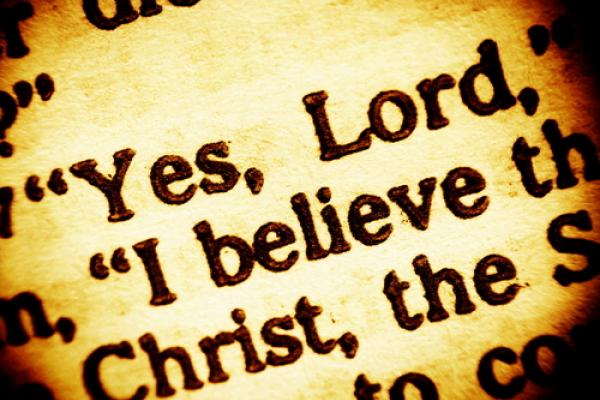I am part of a liturgically worshiping tradition. There are days I wish I wasn’t; days when our Kyrie is lacking splendor and our Eleison feels redundant; moments that I wish we could get to the important stuff — my inspired and infallible message (I kid) — and toss the unending Psalm or Prayers of the Church.
And then there are the other times, when I am guiltily reminded that cutting the creed means missing out on the same words spoken by millions of believers before me. Or when the music just all works and my heart is stirred by the Hallelu– (shhh, its Lent) Chorus.
So I like to remind my community of believers from time to time why we do what we do. I have long felt the risk of liturgy is that it becomes rote narration, a thoughtless speechifying of sorts. So that this might be avoided, here are my thoughts on the creeds and why a corporate confession of faith is still valuable today.
As Paul says in Philippians 2:9-11 there will be a day when all of creation and all people acknowledge that Jesus Christ is Lord, to the glory of God. According to passages such as this, we look forward to a day when this earth will be made new and God's reign over creation will become visible to all. Every creature and all of creation will at that point recognize God, and Jesus as the redeemer, confessing that God is Lord.
Until that day comes, it is helpful for us to make our own confession of faith. We tend to think of confession only as a time when we admit our shortcomings and failings, but confession can also be a positive act where we make a statement of our beliefs. Paul did this in every one of his letters, including 1 Timorthy 3:16 where we see a brief creed about Christ. Such statements of faith can and do come at various points in our lives. We see it at the baptism of a child or adult, as we prepare for communion, and you may have even made confession of faith to a friend — discussing your beliefs about God and Christ.
In our church services we have formalized versions of such statements, regularly using several creeds that have been passed down through history. The shortest and most common of these is the Apostles' Creed. This statement of faith was not actually written down by the apostles but developed gradually over time into the standardized form we have today. The earliest portions can be traced back to the second century A.D when, as the Christian church was growing, there was need for common belief to be expressed among the people.
The Nicene Creed, which is often reserve for special services, is considered to be the oldest creed written down in its full form. In the year 325 A.D., hundreds of leaders of the Christian church from Rome to Alexandria, from Georgia to India, gathered in Nicaea (present-day Turkey) for the purpose of formalizing a statement of faith based upon scripture. This was seen as necessary because of false beliefs and heresies that were popping up in various parts of the Christian world, such as the Arian Controversy.
There is also a third and longer ancient creed, the Athanasian Creed, which was developed later to expound upon Christian beliefs on the Trinity.
So why do we still say these creeds today? These statements of faith are simply a way of keeping us on track. By checking our beliefs against those held by the Christian Church for centuries past, we are able to be sure we have not strayed from the faith. Making these public confessions also unites us with all those believers who have come before us. We speak common words about a common savior because we share a common hope. This faith we hold is not new, it is in fact timeless just as we worship a timeless God.
Michael Middaugh is pastor of Calvary Lutheran Church in Silver Spring, Md.
Photo: Scripture passage, Anastazzo / Shutterstock.com
Got something to say about what you're reading? We value your feedback!
